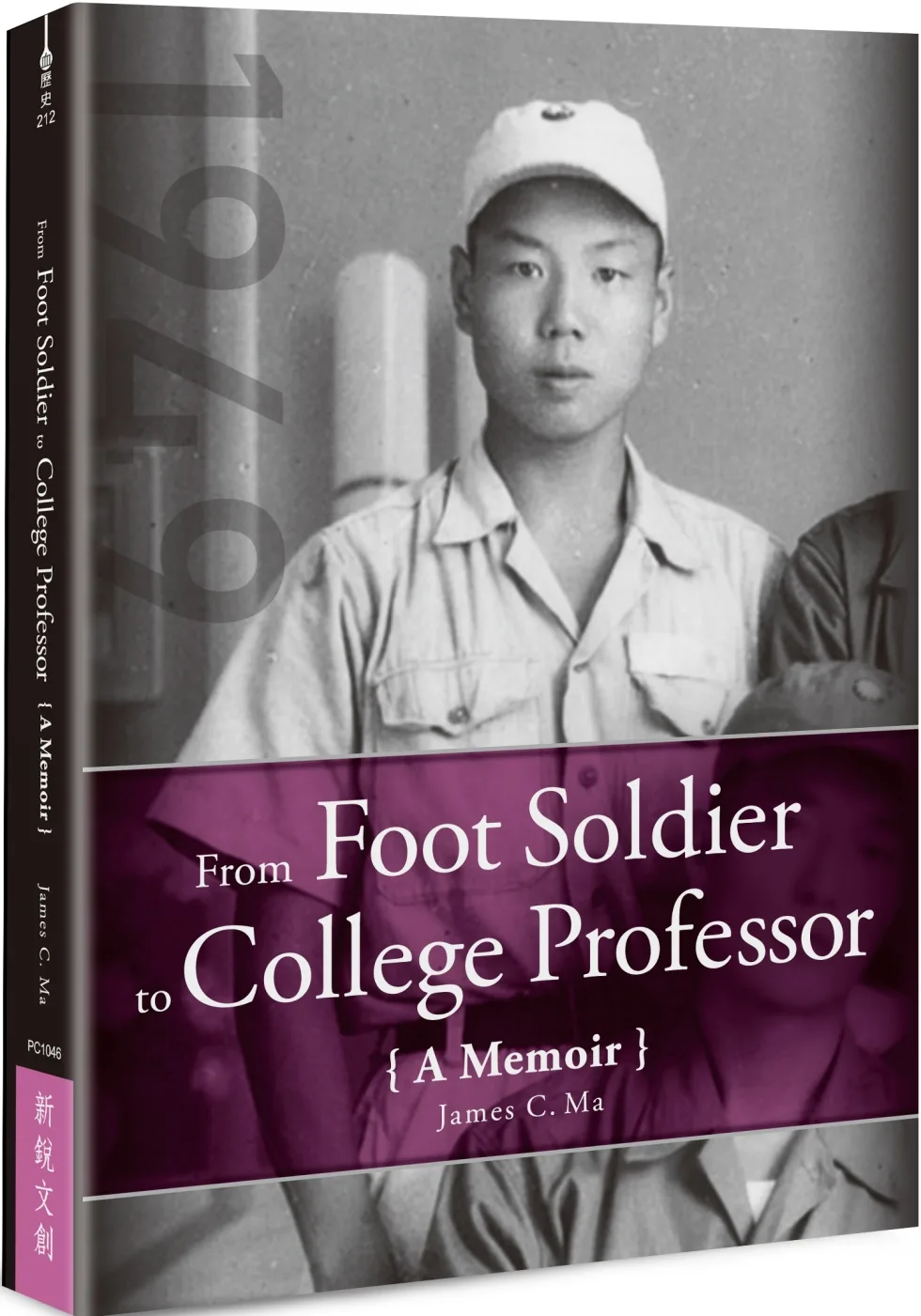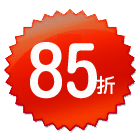- 定價93.00元
-
8
折優惠:HK$74.4

|
|
|
|
From Foot Soldier to College Professor A Memoir
|

|

沒有庫存
訂購需時10-14天
|
|
|
|

|
|
9789865540937 | |
|

|
|
馬忠良 | |
|

|
|
馬忠良(James C. Ma) | |
|

|
|
新銳文創 | |
|

|
|
2022年3月17日
| |
|

|
|
140.00 元
| |
|

|
|
HK$ 119
|
|
|
|
|

| |
|
|
|
|
| |
|
|
詳
細
資
料
|
ISBN:9789865540937叢書系列:血歷史規格:平裝 / 364頁 / 14.8 x 21 x 1.86 cm / 普通級 / 單色印刷 / 初版出版地:台灣
血歷史
|
|
分
類
|
人文史地 > 中國史地 > 人物史/傳記 |
同
類
書
推
薦
|
|
|
內
容
簡
介
|
This is an amazing story of how many sinuous turns a life has got! Nevertheless, James C. Ma is strong enough to have seen it all through. Particularly, James, with his good administrative and leadership skills, shines as Department Head, Dean of Liberal Arts College, Provost and Dean of Students successfully at NCKU. As James College classmate, Im proud of how he rises from foot soldier to both literary professor and poet in name and in reality, never shying away from challenges.”──Fuhsiung Lin on October 4, 2020
“A remarkable personal account concerning one of the epochal periods in Chinese History.”──Dr. Hsincheng Chuang
“The vivid epitome of the individual struggle for survival in the big era; the magnificent life challenges to be admired by the others.”──Chair Professor, Weiming Lu, Institution of Education at NCKU
“Prof. Mas memoir shows his tremendous amount of guts and indomitable spirit in his personal odyssey in the late 1940s when retreating south in the Chinese Civil War. He fulfilled the essence of the quotes from Hemingway as saying: “Man is not made for defeat. A man can be destroyed but not defeated.” He was not defeated nor discouraged by the mistreatmeat of those vicious and illerate cadres on the Penghu Islands, and instead, he succeeded in earning his BA and advanced degrees MA and Ed.D. after he quit the army. This book is a tour deforce. And it inspires me with confidence to pursue my academic career.”──Assistant Prof., Shuimei Chung, I-Shou University
本書特色
1. 成功大學教授、《海鷗詩刊》發行人馬忠良回憶一生,翔實記錄如何從一名山東流亡學生淪為二等兵,再由二等兵發憤成為大學教授的經歷。
2. 英文版由作者費時八年自行翻譯完成,不僅是作者個人的生平經歷,更是1949年國府遷台歷史活生生的見證!
|
|
目
錄
|
Preface
1An Archaeological Site-Ling County
2Nicknamed: The Little Muddle Head
3Elementary School Days
4Secondary School Days
5A Group of Five on the Road to Qingdao
6Selling Shoes in Qingdao
7Shanghai! Shanghai!
8Students Protest at Changanzhen
9The Trip to Longyou
10Rough Road to Fuzhou
11On the Jiho
12Press-ganded into the Army on the Penghu Archipelago
13Life and Death on the Penghu Islands
14Literary Friends in the Army
15Military Training Base in Taiwan
16The Taichung Incident
17Days in the Hospital
18Mr. Li Pingbos Wisdom
19The Waishuang Stream
20Way to Higher Education
21University Days
22Nantou Secondary School
23Eating and Drinking Club
24First Trip to the U.S.
25Working Days in San Francisco
26The Taipei College of Business
27Second Trip to the U.S.
28Return to NCKU Again
29Heading the Department of Foreign Languages and Literature
30Recruiting ESL Teachers in the U.S.A.
31Acting Dean of the College of Liberal Arts
32Dean of Discipline
33Reunion with My Sisters in Hong Kong
34A Poetry Journal
35The Tomb-Sweeping Trip
36The Beijing Trip
37Acting Chairman of Graduate Institute of Education
38Enjoying My Retirement
39Setting Up the Department of Applied English for Leader College
40"Pursuing the Star"
41The Course of Research Methodology
42Hemingway Studies
Epilogue
Bibliography of Chinese Works Cited
Bibliography of English Works Cited
EndNotes
Acknowledgements
|
|
序
|
Preface
This memoir consists of three parts. In the first part, I describe how I, as a teenager, ran away from home in 1948, how I escaped from a Communists’ detention center located in the central eastern Shandong Province, how I survived by being a peddler selling shoes in Qingdao, how I was sort of student again, in an abandoned silk factory at a township, Changanzhen, and how I ran through the hilly lands to get to Fuzhou, and how I joined the army on the Penghu Islands. During the period of six years from 1948 to 1954, at one time, I was in danger of being killed falling off the rather steep cliff of a hill when retreating to the south in the Chinese Mainland, at the other, I almost died of typhus, the terrible disease spread on the Penghu Archipelago. As I ranked non-commissioned officer in the army, I once imagined that if I could be discharged from the army honorably, I would be content with very little living my life out as a nobody somewhere in Taiwan.
In the second part, education comes into focus of my life. With the amount of 940 yuan given to me when I quit the army, I got my undergraduate program done. And with the help of my friends, I got on two trips to the U.S. and earned two advanced degrees. And I was asked back to my alma mater to teach, and assumed many different university administration jobs from chairman of the Department of Foreign Languages and Literature through dean of College of Liberal Arts, chair of the Graduate Institute of Education to the Office of the Student Affairs, the highest position of my teaching career. During those two terms in office, I met with a lot of student protests due to the changes of political climate. I had never been frustrated by their demonstrations, nor did I look for the negative side of the students who had launched those movements. But they were often led by their own ideology, not considering the other students points of view as a whole. Once I thought I was a troubleshooter, “untying all forms of the knots the students had tied for me.” The most regrettable thing was that there were 26 students who died of car accidents and others when I was in office.
The third part is perhaps the heart-rending one. In it, I describe how I invited my sisters to Hong Kong for a family reunion in 1989 and how I paid a visit to my hometown after my 44 years absence in 1992, and kowtowed to my parents mound grave murmuring to them: “Your prodigal son comes back to see both of you.”
I am a man who witnessed a part of the civil war between the Chinese Nationalists Army and the Communists Army when the National Government was retreating south and experienced the 713 Incident that took place in the Penghu Islands. It is called 713 Incident because it occurred on July 13, 1949. It is the cruelest but one, the 228 Incident at the beginning stage when the Generalissomo Chiang Kai-shek withdrew to Taiwan. In this 713 Incident, there are around 5,000 students from Shandong Province pressganged into the army, two principals and six students executed. And it is said that more than ten students who are carried on a fishing boat to the outer sea and put into burlap sacks and thrown overboard. This inhumane action is called “casting anchor.” I was lucky enough to have gone through all of these proscutions as a private soldier and able to live to be an octogenarian man. I hope this memoir of mine can testify about a part of that historical era.
?
|
|
|
書
評
|
|
|
|
|

